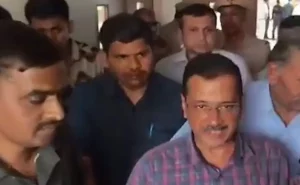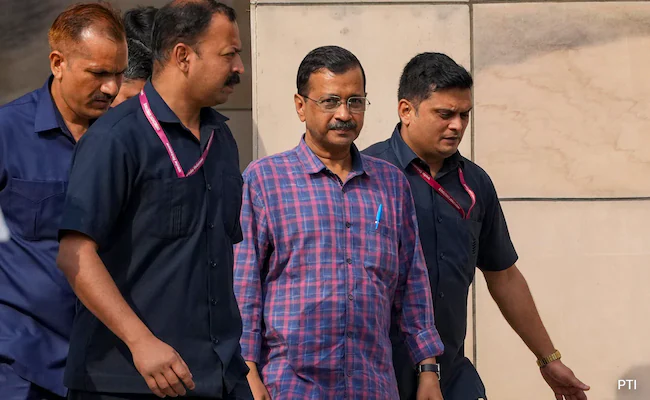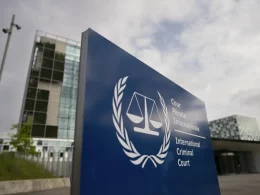The unfolding legal drama surrounding Arvind Kejriwal serves as a stark reminder of the intricate nexus between law, politics, and power. As the case continues to unfold, the nation watches with bated breath, awaiting the resolution of a conflict that holds profound implications for the principles of justice and democracy.
Delhi Chief Minister Arvind Kejriwal and the Enforcement Directorate traded sharp barbs and hard-nosed legal arguments in equal measure Wednesday, as the Delhi High Court heard the Aam Aadmi Party boss’ plea for interim relief.
As per the cause list uploaded on the high court’s website, Justice Swarana Kanta Sharma will pronounce the order at 2:30 pm on tomorrow Tuesday 2024
Earlier, appearing for Mr. Kejriwal, senior advocate Abhishek Manu Singhvi began his argument by claiming “sole purpose of the arrest (of the Delhi Chief Minister) is to humiliate… incapacitate” the AAP, which is seen by many as the only real challenger to the BJP for Delhi’s seven Lok Sabha seats.
During the arguments Additional Solicitor General SV Raju, representing the ED, issued a strong rejoinder to arguments about the timing of Mr. Kejriwal’s arrest, declaring “criminals are supposed to be arrested and put in jail”. “Under-trial prisoners have no right to say, ‘we will commit a crime and we will not be arrested because elections are here’. This is completely ridiculous,” Mr. Raju declared.
Arvind Kejriwal’s Bail Argument :

Mr. Singhvi earlier argued the ED “does not have any evidence” and that the agency made no attempt to first take his statement; this was when an ED team was at the Chief Minister’s residence. “‘Level playing field’ (before an election) is not just a phrase. It is part of ‘free and fair elections’ which is part of a democratic structure. This case reeks of timing issues,” Mr. Singhvi began. “What is this urgency? I am not talking about politics… I am talking about law,” he continued, arguing the arrest was meant to “demolish Aam Aadmi Party before first vote is cast”.
Mr. Singhvi also questioned the ED over the issue of multiple summons to the Chief Minister, particularly after the AAP leader had moved the court to challenge the agency’s call.
“…my not responding to summons is a nice point of prejudice… it is a red herring,” he said, referring to the nine letters sent by the ED demanding that Mr Kejriwal join the investigation.
“Was there a possibility of Arvind Kejriwal fleeing? Did he try to influence any witness in one-and-a half years? Did he refuse to be questioned?” the senior advocate asked.
Mr. Singhvi also referred to the clutch of statements against the Delhi Chief Minister.
“…in first statements there will be nothing against me. Some are arrested and, for first time, they give a statement against me and get bail without objection. Then they get pardon and become approver.”
The court observed Dinesh Arora – one of the accused-turned-approvers – did not implicate Mr. Singh initially. Mr. Singh was arrested after he was named in a later statement. Dinesh Arora got bail in August.
“Prosecution is saying, ’till you give statement against Kejriwal, I’ll keep recording…'”
“Is it not shameful? Out of 13 statements by (Magunta) Reddy, he says nothing in 11. But the judge will go by one? All others are also under Section 50 (of the PMLA),” Mr. Singhvi said.
Cash of ₹ 45 Crore Approx:
Calling AAP, the “major beneficiary of the proceeds of crime generated in the Delhi Liquor Scam”, the ED claimed, “Part of the proceeds of crime to the tune of cash of ₹ 45 Crore approx. has been utilized in the election campaign of AAP in Goa Assembly elections 2022”. Arvind Kejriwal was arrested by the ED on March 21 after the high court refused to grant him protection from coercive action by the federal anti-money laundering agency.
Arvind Kejriwal has also challenged his subsequent remand in ED’s custody (File):
The Delhi High Court is scheduled to deliver a plea by Chief Minister Arvind Kejriwal, who is in judicial custody in a money laundering case linked with the alleged excise scam, challenging his arrest. Besides his arrest, Arvind Kejriwal has also challenged his subsequent remand in the Enforcement Directorate’s custody. He was later remanded in judicial custody and is currently lodged in Tihar jail.
The AAP national convener has questioned the “timing” of his arrest by the agency and said it was in contravention of the basic structure of the Constitution, including democracy, free and fair elections and level playing field. He was sent to judicial custody in the case on April 1 after he was produced in the trial court on expiry of ED custody.
The matter pertains to the alleged corruption and money laundering in formulating and executing the Delhi government’s excise policy for 2021-22 that was later scrapped.
What Enforcement Directorate Said ?
“Suppose a political person commits a murder before the election. Will he not be arrested? Will his arrest harm (the election)? You commit a murder and say I cannot be arrested because it will violate…” Mr. Raju declared, trying to draw a parallel to the corruption charges against Mr. Kejriwal. The ED – which Mr. Kejriwal earlier said had no real evidence of his involvement, much less his central role in the alleged scam – also insisted “a money trail is there… we have traced the money trail”.
The ED further waved away claims by Mr. Kejriwal that his arrest and that of ex-Deputy Chief Minister Manish Sisodia, was largely based on statements by accused-turned-approvers. The AAP has pointed to a pattern – the first of multiple statements do not name party leaders, and it is only after arrest and questioning that the accused-turned-approvers change their statements.
Responding to this – which question was also posed by the Supreme Court Tuesday, as it gave AAP MP Sanjay Singh bail – Mr. Raju argued accused persons may change their statement after being presented with evidence. “When accused is confronted with material (then) they say ‘I was wrong’.”
“You cannot avoid statements and say, ‘No, no… these cannot be trusted. Cash payment was made… cash that was not accounted for. Source of the cash was a bribe… it could be ₹ 100 crore or a little less than that. This has been accepted by the AAP candidate as well,” he continued.
Arvind Kejriwal In Tihar Jail:
Mr. Kejriwal’s arrest on March 21 – after the High Court refused protection – has roiled his AAP and the Congress-led INDIA bloc. The opposition has accused the ruling BJP of a “political conspiracy”‘ i.e., of using central investigative agencies, like the ED, to target political rivals before the election.
Mr. Kejriwal is currently in Delhi’s Tihar Jail No 2, with Mr. Sisodia and another AAP leader, former Delhi Health Minister Satyendra Kumar Jain, who was arrested in an unrelated money laundering case.
On Tuesday Mr. Kejriwal was remanded to judicial custody till April 15, after spending over 10 days in the agency’s lock-up. The ED did not seek further custody but said his release could hamper its probe.
Conclusion:
As the legal saga played out, the fate of Arvind Kejriwal hung in the balance. His plea for interim relief echoed the broader struggle for justice and accountability in a complex political landscape. Amidst the cacophony of legal arguments and political posturing, one thing remained clear – the battle for truth and transparency would shape the contours of India’s democratic future.












